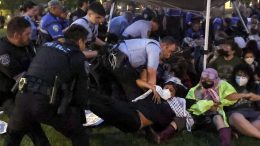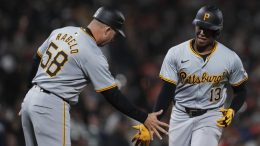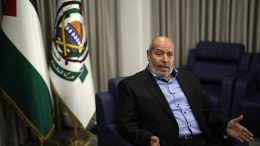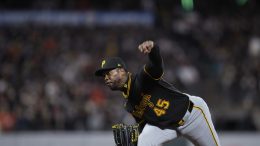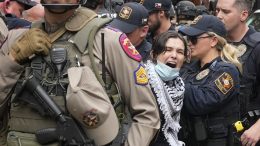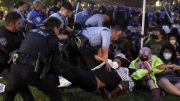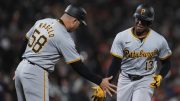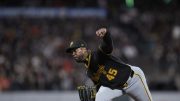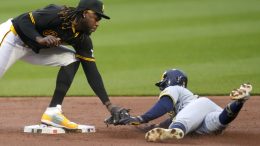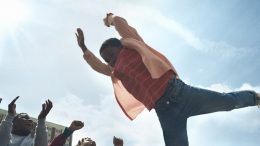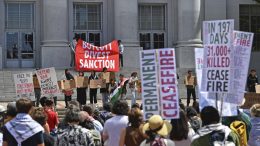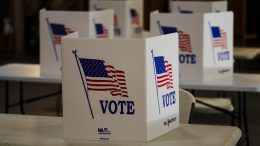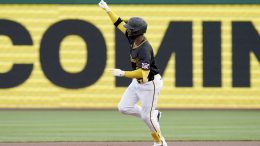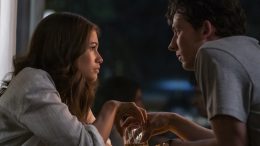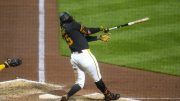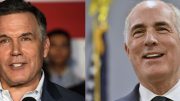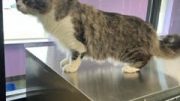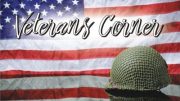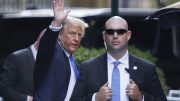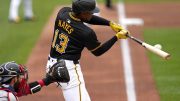NEW YORK (AP) — On one of the highest floors of a Lower Manhattan office tower, New York street artists have spent the past year spray-painting and splashing their graffiti, murals and other wild creations across pristine walls, windows, floors and ceilings.
But no, it isn’t vandalism.
Developer Larry Silverstein allowed the 50 artists to turn 34,000 square-feet of office space that normally would rent for about a quarter of a million dollars a month into their own sprawling canvas. Multi-colored graffiti and other works by sculptors and painters explode with images of fantasy and reality, tragedy and comedy.
At 86, Silverstein is still a force in the rebirth of the World Trade Center site devastated by the Sept. 11 attacks that killed more than 2,600 people in New York.
“Here I am, an old fogy, but I wanted to do something exciting and different, and to provide a sense of beauty, a sense of peace, in an otherwise difficult world,” he says.
His 72-floor tower, 4 World Trade Center, was the first to rise on the 16-acre site a dozen years after the attacks. Now, the unoccupied 69th floor is covered in colors, squiggles, lyrics, faces and sculpted forms. The floor-to-ceiling windows offer stunning views of the 1,776-foot One World Trade Center, the Hudson River and the memorial reflection pools where the twin towers once stood.
The new tower’s top 11 floors, including the art-filled space, have been leased by Spotify, the Stockholm-based music-streaming company that is moving into other floors but hasn’t yet decided how to incorporate the artworks into its corporate style.
“It is our intention to keep as much of the art as possible,” said Spotify spokesman Graham James.
The free-standing works are the property of the artists who created them, at no charge.
A 9/11 tribute called “In Bloom” by David Uda is a 20-foot circle on the floor painted with 2,606 flowers in memory of the dead.
Sean Sullivan has a personal connection to the site; his father was a detective with the city police bomb squad who lost his best friend on 9/11 and was himself hurt. His shield number is highlighted in Sullivan’s mural, “Beautiful Cleanup.”
David Hollier sprinkled lyrics from the Broadway musical “Hamilton” into his “$10 Bill,” which looks over the graveyard at Trinity Church where Alexander Hamilton is buried.
And Ron English, who is known as “The Godfather of Street Art,” brought the streets into the studio in the sky for his “No Brain No Pain,” which features reddish brain tissue fashioned into a boxing glove.
Silverstein Properties’ chief marketing officer Dara McQuillan discovered the artists through a Lower Manhattan art shop called the World Trade Gallery where he had some photographs framed. There, he saw the work of some of the artists who were then invited into the Silverstein property.
While the skyscraper studio is not open to the public, it has exposed artists to visiting gallery owners and dealers.
“Every little bit helps,” says Miguel Ovalle, whose revolving, spaceship-like sculpture stands in an open area on the 69th floor.
Sullivan, the mural artist, says project participants are getting a big payoff.
“All the promotion and marketing is worth gold to us, plus we need a place to paint; that’s payment enough.”




